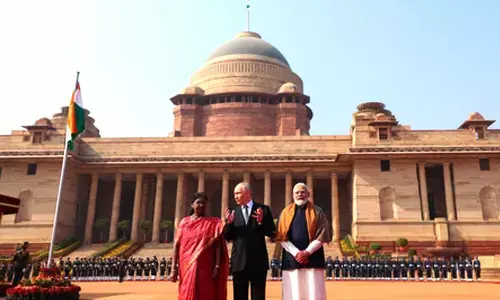Telangana in the forefront

Closely on the heels of southern states, Karnataka and Kerala, the Telangana government is also gearing to raise its share in the revenue from e-commerce trade in the state.
The travails of e-tailing appear to get solution only in the proposed GST regime, wherein both goods and services are put under the same tax rates. The taxes on inter-state supply of goods and services under the GST would go to the consuming State. However, the delay in clearance of the GST bill in parliament has led to demand for an ad hoc tax model to protect the states’ interests. While Telangana is far ahead on the lookout for a share in the e-tailing revenue, AP government is yet to make a beginning; perhaps its numbers are not so alarming. Eventually, both the States, known for their highest penetration of internet in the country, will demand a slice of the e-commerce cake
.jpg)
Closely on the heels of southern states, Karnataka and Kerala, the Telangana government is also gearing to raise its share in the revenue from e-commerce trade in the state.
The obvious loss of tax revenue due to growing e-retailing business in the state, especially, in the city of Hyderabad, has left its coffers high and dry in the last quarter though the Amazon and Flipkart, the global e-tail units, reported almost a whopping 32 per cent share in the national online sales from the residual AP (8%) and Telangana (24%) states.
According to the initial estimates by the states tax department, only one e-tailing portal itself is making a business of over Rs 2,500 crore, as we see a host of carrier boys moving on the street to deliver the goods.
The huge transactions of e-business have been reported without any tax realisation to TS government coffers, says a government source. All these revelations have driven the Commercial Tax department to collaborate with I-T consultants to study how e-commerce can be taxed.
The study is also to understand the methodology how a share in the VAT can be accounted for the last point of sale and delivery. One formula being going round is to levy sales tax on each e-commerce transaction with point of delivery in the state. However, the government is still not taken any decision on this.
The e-commerce companies are governed by central sales tax laws, hence they do not come under VAT on the goods supplied to the consumer states.
Interestingly, the majors like Amazon and Flipkart among others, encouraged to set up their fulfilment centres in Hyderabad and as facilitators of these transactions, they are only liable to pay service tax under the CST. The huge revenues swept by these companies are the eye sore to state governments which see a loose end in its commercial tax policy.
Apart from loss tax, even the local malls and retailers also facing trouble as the loss of foot-fall at their establishments leading to closures of shops and loss of employment.
Under the popular B to C business model, manufacturing states are walking away with all the tax revenue and the consumer states are denied of VAT share though the sales actually take place in their territory where the goods are delivered.
According to the estimates, there are close to 3 billion internet users in the world of which India accounted for over 250 million broadband subscribers and is considered a big spender on trivia which include religion, fancy goods, entertainment and life style with neo-rich community of booming IT workers.
India is well positioned, thus, for the e-retail sector and transforms brick and mortar units into virtual shops. Hyderabad with its huge IT population is fully exposed to e-explosion from cinema booking to online food ordering.
E-tail boom in Telangana
As a mid-path approach, the officials say that the Telangana government is contemplating to impose tax at the rate of ½ to ¾ per cent in the form of cess on all e-commerce deals taking point of delivery method, as against other states plan to charge about 1 per cent. This way, the state would still attract the e-commerce majors to setup their fulfilment centers in the state.
Interestingly, the Andhra Pradesh government is yet to focus on tapping tax revenue from the burgeoning e-tailing trade because of its leapfrog foray into infrastructure explosion (Amaravati and urban utilities) and present inability to protect local traders.
Considering its cosmopolitan nature, the Hyderabad offers notable growth in e-tailing business, the sunrise sector. Unfortunately, the State has no benefit from this huge opportunity.
Experts point out that if e-commerce business goes unchecked in both Telugu states with growing online trade for goods and service, it will deny a level-playing field to the brick and mortar traders who set up shops and pay also VAT.
On the other hand, the city’s traditional merchants are facing the heat as their business like textile, jeweller, grosser, pharmacy, etc are forced to close their shops as the foot falls are falling.
Hyderabad epi-centre of e-tailing
As the market is increasing, the e-commerce majors like Amazon, Flipkart, Snapdeal etc, are setting up fulfillment centres in Hyderabad. While Amazon has one of its largest fulfilment centres in Hyderabad and considering setting up second one, the Flipkart has decided to set up warehouse and Swedish furniture major IKEA has bought 13 acres storage unit in the city.
These units are planning to shift their business to Hyderabad from Bangalore after Karnataka government slapped a 1 per cent tax on an e-commerce transaction in the form of VAT.
The e-commerce portals plea that they are not doing any business transaction and all that they do is maintain the stocks, packs them and dispatches them and hence be exempted from VAT and the government should levy tax from direct sellers.
Interestingly, every other state including Uttar Pradesh, Tamil Nadu, Uttarakhand, Madhya Pradesh etc are considering 1 per cent tax under VAT.
Conclusion
It is proper for the states to levy tax, but classifying the goods itself is a difficult task and calls litigation. For example, for several decades the governments are unable to classify digital products. One can down load film or music surely for a price but not paying entertainment tax.
Telengana government is considering a host of short-term and long term initiatives to stem to revenue loss which is huge. Primarily it is planning to bring e-commerce under the tax net, second, make registration of all couriers involved in the delivery mandatory, the third would be focusing on to manufacturing and become self-sufficient in FMCG and consumer durables.
KVVV Charya
Next Story




















